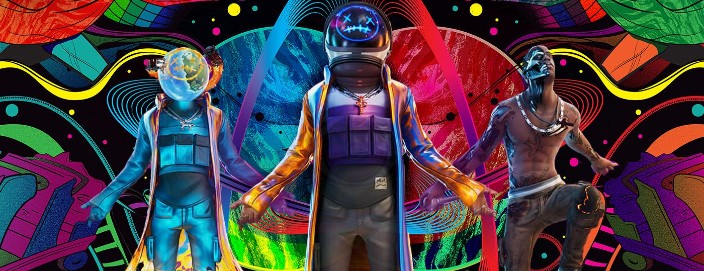Fortnite becomes the COVID concert venue for Gen Z and Millennials
![]()
Travis Scott’s Fortnite concert shows a way forward for music
It’s no secret the COVID-19 pandemic has presented unprecedented challenges to the music industry. With concert venues closed and lucrative tours canceled around the world, artists have pivoted to busking on Instagram Live and becoming Twitch affiliates to reach quarantined fans. As he’s often done during his rise to stardom, rapper Travis Scott thought bigger. With gaming usage up 75 percent during the COVID-19 outbreak, why not bring the music to the place where people are already congregating?
For many gamers, that place is Fortnite. The battle royale building game created by Epic Games has more than 300 million registered users, and as a frequent player, Travis Scott has had a front-row seat to watching Fortnite grow into a powerful marketing platform. Over the past year, the game has become a proto-metaverse platform where Gen Z and Millennials congregate and brands willingly intermingle. Epic Games hosted its first in-game event in February 2019, an in-game concert starring EDM artist Marshmello that proved wildly popular. Sensing a golden opportunity to reach its target demographic in the lead-up to the Star Wars: The Rise of Skywalker release, Disney chose Fortnite as the platform to reveal a new clip of the film with director J.J. Abrams. And during its launch week this past March, the short-form video platform Quibi screened episodes of its Punk’d reboot starring Chance the Rapper in a theater within the game. Even outside of in-game events, global giants like the NFL, Nike, and Marvel have all found value in incorporating their brands into Fortnite, and the crossovers show no sign of slowing down.
This past weekend, Scott launched a series of digital concerts within Fortnite to reveal “The Scotts,” a new collaboration with Kid Cudi. Over the course of three days, players could congregate at set times to see a kaiju-sized digital version of Scott invade the world and perform a series of songs that culminated with the new track. It became appointment viewing for players and streamers alike, with famous content creators like DrLupo, Valkyrae, and Tfue bringing their sizable viewing audiences on platforms like Twitch and YouTube to the event. The first performance drew a Fortnite-record 12.3 million concurrent players to the game, and nearly 28 million attended the event overall, but that was just the opening salvo of Scott’s resonant marketing effort.
Treating the event like a regular tour, Scott’s self-owned record label produced exclusive merchandise, including concert tees, branded thumbstick grips for PlayStation and Xbox controllers, action figures, and even a Nerf gun. Much of it sold out immediately. The performance also featured several close-ups of Scott’s Jordan 1 Retro High limited edition sneakers, which originally retailed for $175 but are now regularly selling for more than $1,600 on StockX. When “The Scotts” launched on Spotify after the first Fortnite event, it landed at number one with 7.45 million streams, a record high for a global streaming debut on the platform this year.
Travis Scott’s success with this in-game concert “tour” will not be an anomaly. With a cloud of uncertainty hanging over the timeline for venues re-opening, and the reality that it could take even longer for health-conscious music fans to feel comfortable attending large gatherings in the wake of the pandemic, pivoting to digital events will be an invaluable way for musicians to engage their audiences and generate the revenues necessary to continue creating their art moving forward. Games like Fortnite and Minecraft, which plans to host its own music festival on May 16 featuring bands like Massive Attack and IDLES, are leading the way in creating interactive experiences that go beyond passive viewing and make participants feel like they are a part of the moment.
The sustained success of in-game events should also leave no doubt that Fortnite has grown beyond just being a “game.” It’s now a bonafide social platform that makes a convincing case for the emergence of a sustainable metaverse where people can gather regardless of platform to assume a virtual identity, mingle, play games, shop for virtual goods, or even attend a concert with friends. And best of all, since the venue is virtual, the tickets won’t sell out.

